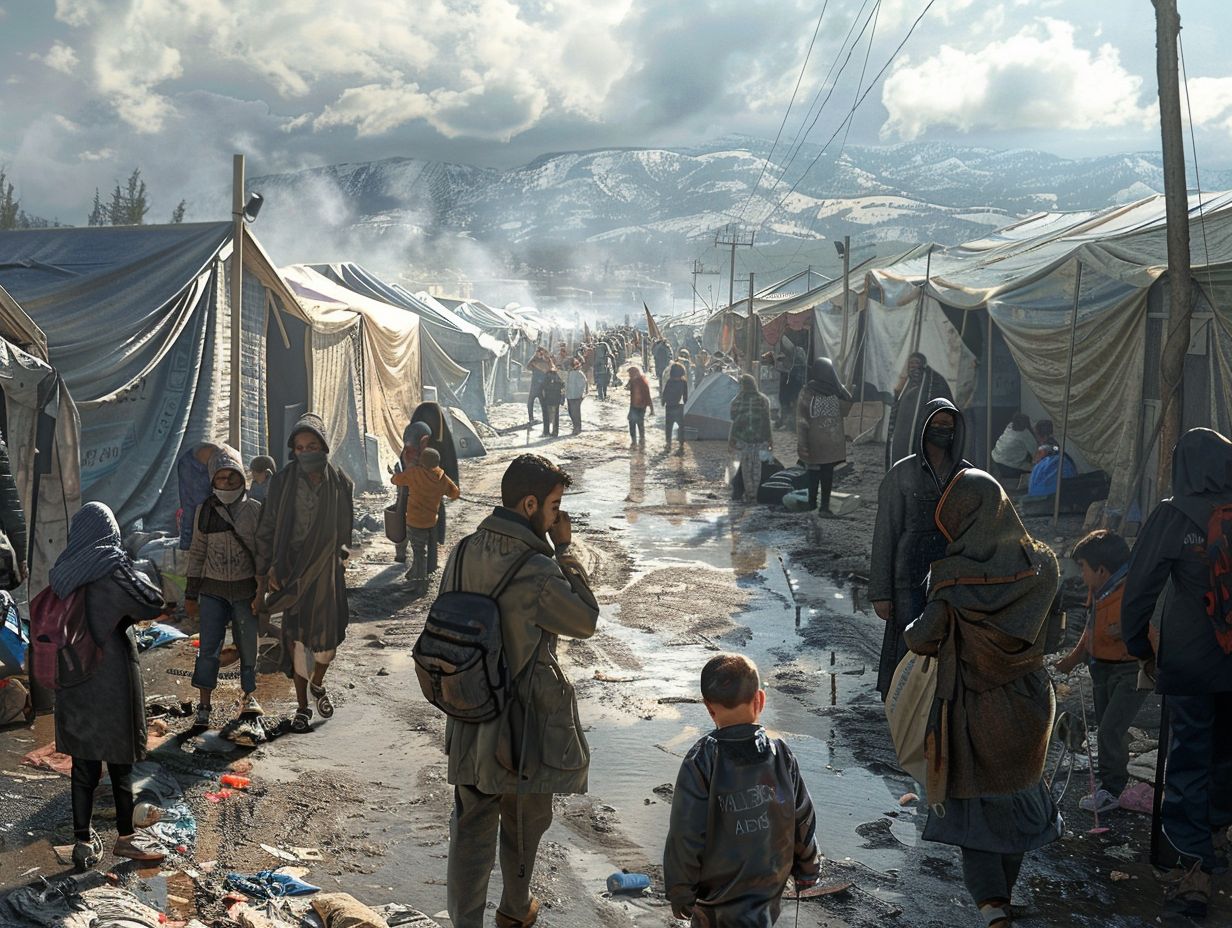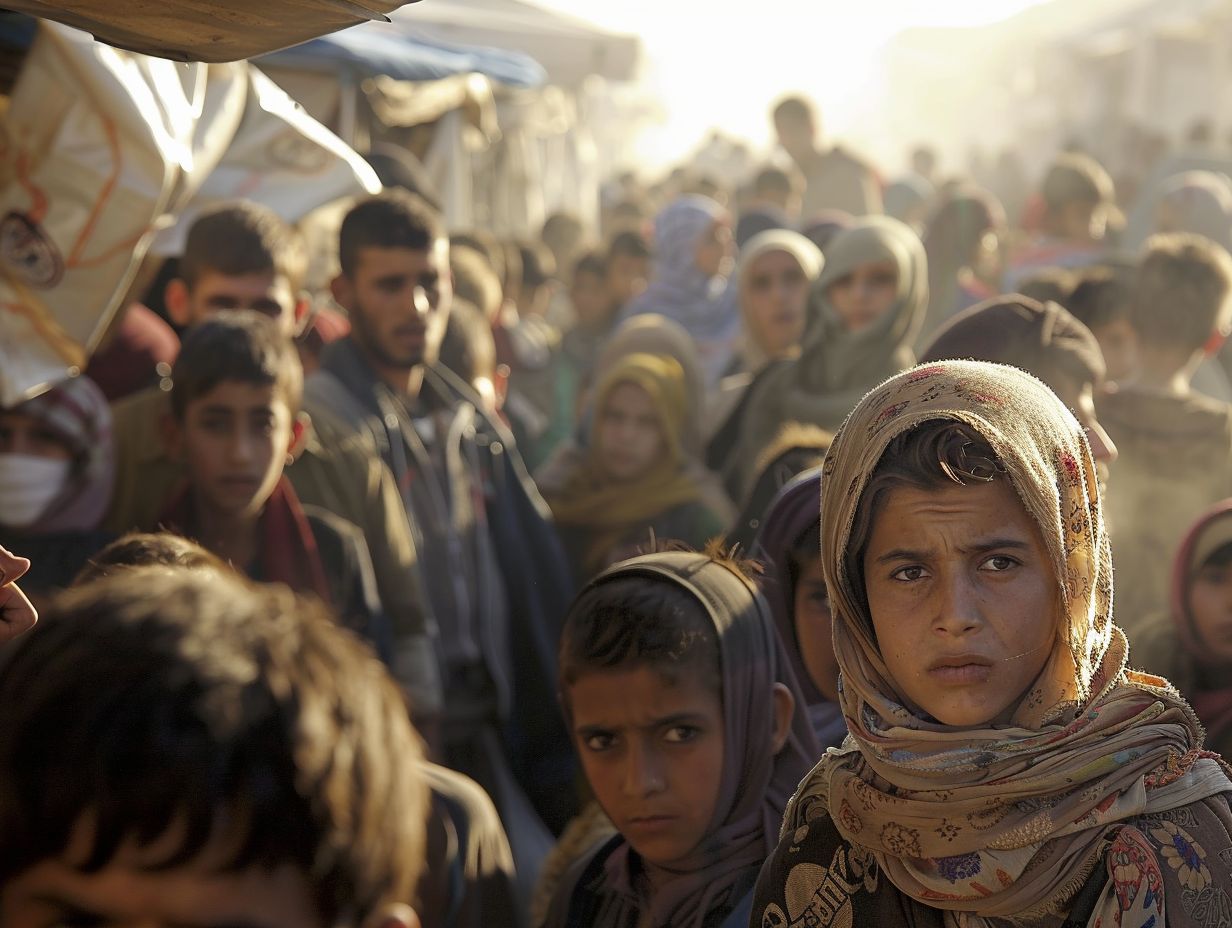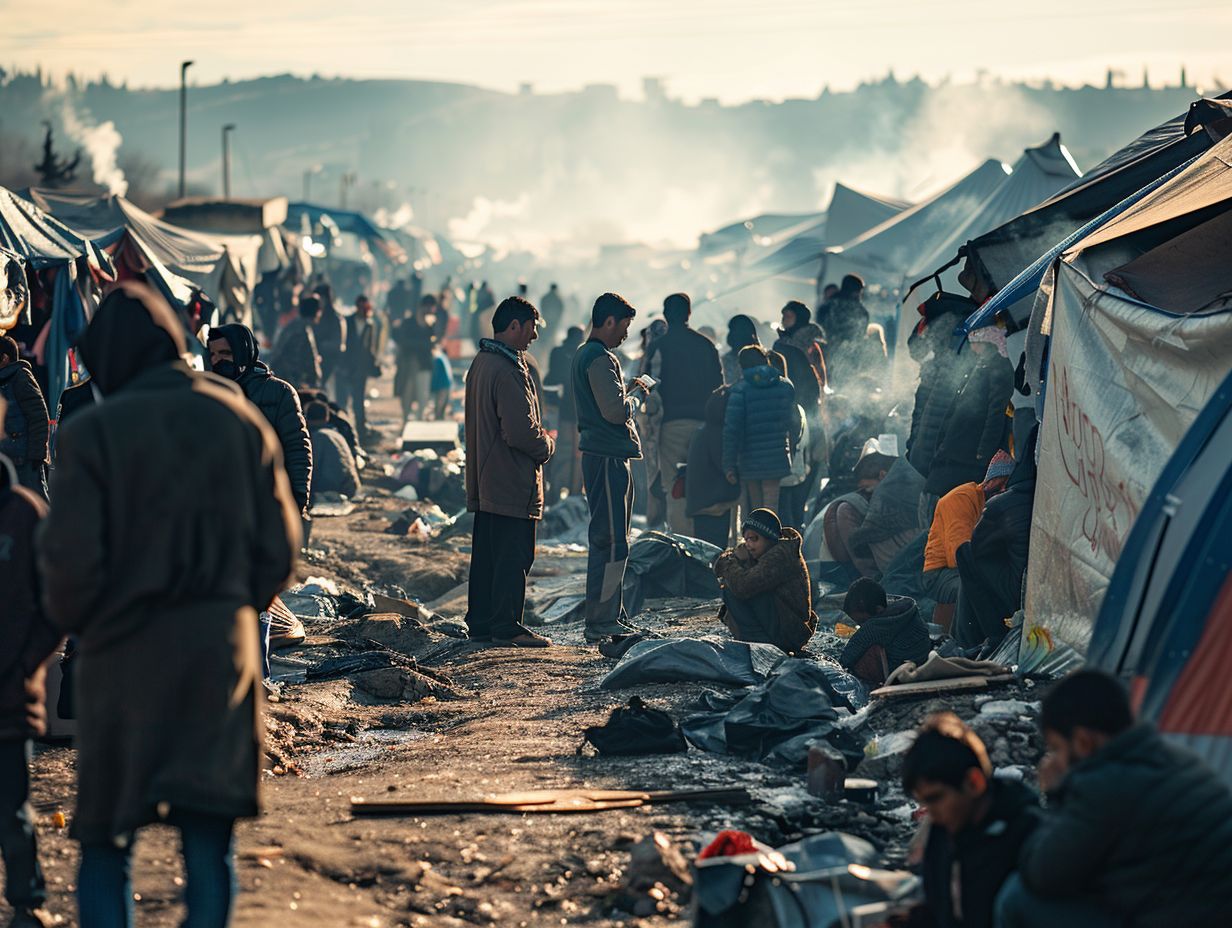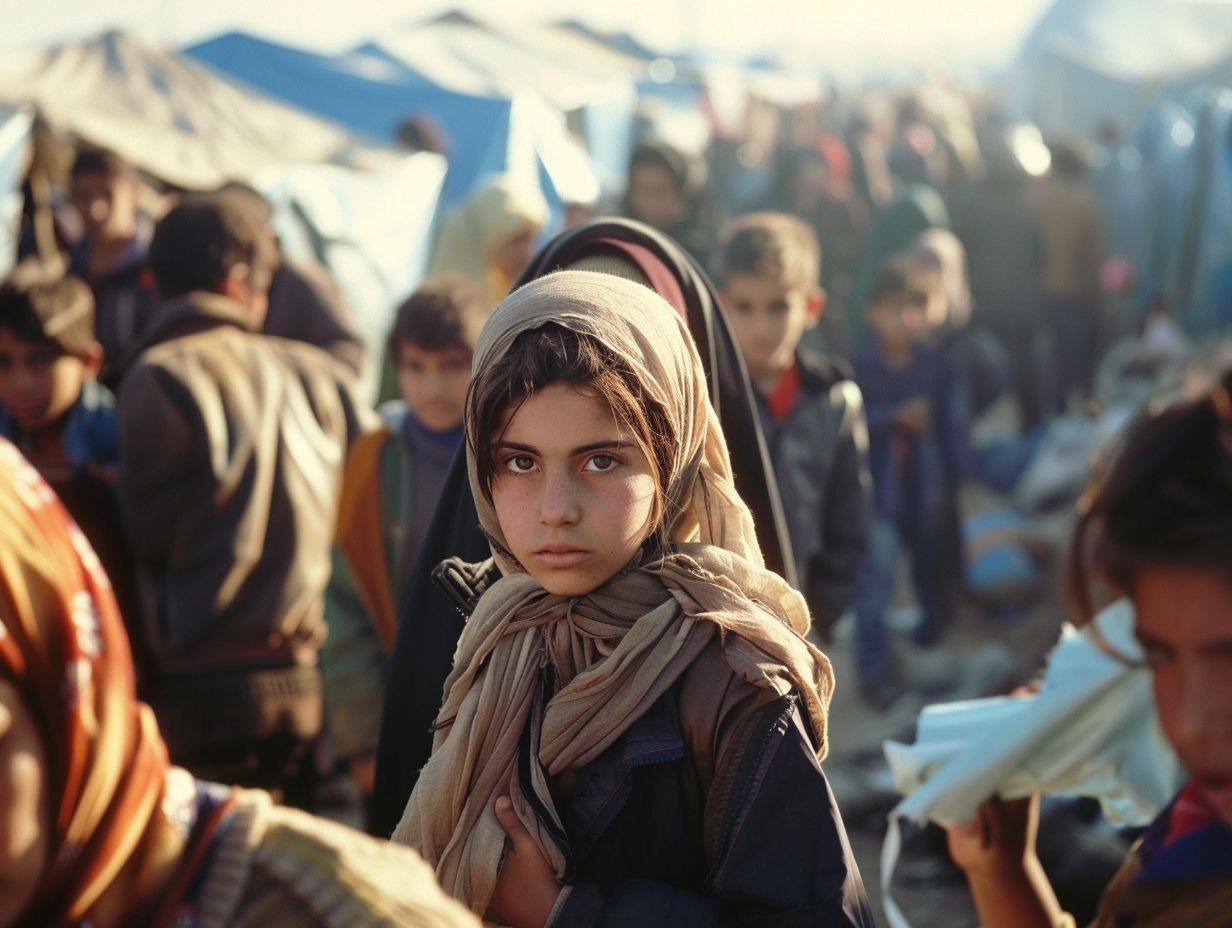Refugees and asylum seekers like you face numerous challenges as you flee your homes in search of safety and security. You encounter physical, mental, and socio-economic obstacles on your journey, from understanding the terminology to navigating legal processes.
This article will explore the causes of displacement, the challenges you face, and the support available to help you access basic needs and legal assistance. Delve into the complexities of supporting those in need of refuge and asylum with us.
Definition of Refugees and Asylum Seekers

Refugees and asylum seekers are people who have had to leave their home countries because of persecution, war, or violence. They’re looking for safety and a fresh beginning in a new place, trying to figure out tricky legal statuses and immigration processes during tough displacement situations.
Understanding the Terminology
Understanding the terminology surrounding refugees and asylum seekers is essential for grasping their legal status and the asylum process they must navigate. It often involves dealing with a lot of paperwork and legal requirements.
You see, refugees are folks who had to flee their home countries because of persecution, war, or violence. On the other hand, asylum seekers are individuals who are seeking international protection but haven’t been officially recognized as refugees yet.
So, if you want to seek asylum, you’ve got to put together an application that explains why you need protection. You’ll need to gather all sorts of supporting documents like personal statements, witness testimonies, medical records, and any other proof that backs up your claim. After you submit your application, get ready for interviews and hearings to determine if your reasons are legit and if you qualify for refugee status.
Causes of Displacement
You might find yourself displaced for a variety of reasons. Conflict zones, war, persecution, and poverty are some major factors that push millions of people into forced migration each year.
Factors Leading to Forced Migration
When people are forced to leave their homes and move elsewhere, it’s usually due to a mix of things like war, persecution, poverty, and the chaos that comes with living in conflict areas. These factors combine to create a dangerous and uncertain situation that makes folks decide to leave their homes in search of a better future.
Take war, for example. It messes up communities, wrecks infrastructure, and puts lives at risk, leaving folks with no other option but to run away to keep themselves and their families safe. Then there’s persecution – whether it’s because of political views, religion, or ethnicity. It can force people to hide or leave their country, with no choice but to seek safety elsewhere.
When poverty gets mixed into the equation, things get even tougher. Conflict and limited job opportunities can leave families struggling to afford even the basics, pushing them to move in search of a more stable life. And living in conflict zones – with all the violence and chaos – isn’t exactly a peaceful way to exist. So, it’s no wonder people in those situations decide to seek refuge in other countries where they can start over and rebuild their lives.
Challenges Faced by Refugees and Asylum Seekers
When you’re a refugee or asylum seeker, you face a bunch of tough challenges. From dealing with past traumas to struggling to fit in, and even having to tackle discrimination and xenophobia in your new surroundings.
All of this can make it harder to find a place to live, get a job, access education, and healthcare services. And let’s not forget the toll it can take on your mental health.
Physical and Mental Health Challenges

You might face physical and mental health challenges as a refugee or asylum seeker, mainly because of past traumas and limited access to healthcare services. These issues can really take a toll on your emotional well-being and overall quality of life.
If you’re in this situation, chances are you’ve been through some tough times like conflict, violence, or persecution in your home country. These experiences leave deep emotional wounds that need specialized mental health support. But getting the help you need can be tough due to scarce resources and language barriers. This lack of access can lead to untreated trauma, higher levels of anxiety and depression, and a loss of hope and resilience. Without the right support, the cycle of mental health challenges keeps going, making it hard for you to adapt to your new environment and start rebuilding your life.
Socio-economic Challenges
When you’re a refugee or asylum seeker, you’re up against some tough socio-economic hurdles. You’ve got to figure out how to land a steady job, find a decent place to live, and battle discrimination just to get an education and some financial opportunities.
The job market can feel like a maze with dead ends for you because your qualifications and work history often get overlooked, even though you’ve got some serious skills. And don’t even get started on finding affordable housing – it’s like searching for a needle in a haystack. Plus, you’re constantly facing unfair treatment that only makes your journey towards stability even harder.
Getting a good education is key to your future, but biases and language barriers keep throwing obstacles in your way. Dealing with discrimination doesn’t just mess with your finances – it messes with your head, too, creating a whole web of challenges that you’re forced to tackle in your new surroundings.
Access to Basic Needs
For refugees and asylum seekers, getting access to basic needs like food, shelter, and clothing can be a major struggle. They depend a lot on social support systems to help them meet these essential requirements.
Food, Shelter, and Clothing
Food, shelter, and clothing are critical needs for you as a refugee or asylum seeker, usually provided through social welfare programs and refugee camps. These are more than just the basics; they give you a sense of security and dignity during your displacement.
Social welfare programs are key in making sure you have access to good meals, safe places to stay, and suitable clothing. Refugee camps, even if they’re packed and short on resources, act as temporary homes where you can get these essential things. The quality of conditions in refugee camps varies, with some offering better facilities and services than others, but overall, they act as a vital support system for people like you.
Legal and Administrative Challenges
You’ve got a lot on your plate when it comes to legal and administrative hurdles. From figuring out the asylum process to getting all the right paperwork and finding legal help, these challenges can be real roadblocks on your path to gaining legal status in a new country.
Navigating the Asylum Process

When navigating the asylum process, you need to wrap your head around legal protections, get that asylum application filed, and make sure all your paperwork is in order to steer clear of deportation.
To understand your legal protections, you must know what rights you have when seeking asylum. These rights include being shielded from being sent back to a country where your life or freedom is on the line.
Regarding the asylum application, you’ll have to fill out detailed forms and gather supporting documents explaining why you need asylum. Having the right documentation is key because it acts as proof to back up your asylum claim and can help prove your eligibility for protection.
It’s crucial to get all your documents in order – think identification, personal statements, police reports, and any other evidence that supports your case. This will help you build a solid asylum case and reduce the chances of getting deported.
Support for Refugees and Asylum Seekers
Regarding supporting refugees and asylum seekers, you’ve got a range of social services, resettlement programs, and humanitarian aid at your disposal. Community resources and advocacy groups are there to help you navigate this new chapter in your life and make sure you get the support you need.
Organizations and Resources Available
If you’re a refugee or asylum seeker, you’ve got a support network waiting for you. There are humanitarian organizations, resettlement agencies, and community-based advocacy groups that are here to provide crucial social services and support when you need it.
These organizations are like superheroes, making sure you’re safe and settled in your new community. The humanitarian organizations are all about that immediate help – like giving you shelter, food, and medical care when you’re in crisis. Resettlement agencies are the long-term thinkers, helping you find a home, a job, and access to education. And those advocacy groups? They’re fighting for your rights and offering legal aid to make sure you’re treated fairly and have access to all the services you need.
Frequently Asked Questions
What are some common challenges faced by refugees and asylum seekers?
Some common challenges faced by refugees and asylum seekers include language barriers, cultural adjustment, finding employment, accessing education and healthcare, and facing discrimination and prejudice.
How does language barrier affect refugees and asylum seekers?

Language barrier can be a major challenge for refugees and asylum seekers as it can make it difficult for them to communicate with others, access necessary services, and find employment opportunities. It can also lead to feelings of isolation and exclusion.
What is the impact of cultural adjustment on refugees and asylum seekers?
Cultural adjustment can be a significant challenge for refugees and asylum seekers as they have to adapt to a new culture, customs, and way of life. This can be overwhelming and cause feelings of anxiety, confusion, and homesickness.
How does the process of seeking asylum affect refugees and asylum seekers?
The process of seeking asylum can be lengthy, complex, and emotionally draining for refugees and asylum seekers. They may face challenges such as navigating legal systems, dealing with traumatic experiences, and uncertainty about their future.
What are some common barriers refugees and asylum seekers face in accessing education and healthcare?
Refugees and asylum seekers may face barriers such as lack of documentation, language barriers, and discrimination when trying to access education and healthcare services. This can have a negative impact on their well-being and future opportunities.
How can discrimination and prejudice affect refugees and asylum seekers?
Refugees and asylum seekers may face discrimination and prejudice based on their nationality, race, religion, or status. This can lead to social exclusion, limited job opportunities, and difficulty in finding housing, which can impede their integration into a new society.